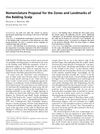 24 citations,
April 2017 in “Journal of Investigative Dermatology”
24 citations,
April 2017 in “Journal of Investigative Dermatology” Age, smoking, and lower BMI increase facial wrinkles; men wrinkle more than women, except in old age; pale skin and certain hormonal factors can protect against wrinkles.
 8 citations,
April 2001 in “Dermatologic Surgery”
8 citations,
April 2001 in “Dermatologic Surgery” Michael L. Beehner proposed a standardized way to describe balding areas on the scalp to help hair restoration experts communicate better.
 December 2023 in “European Journal of Psychology Open”
December 2023 in “European Journal of Psychology Open” Men who are perfectionists feel more upset about baldness, partly due to aging anxiety.
 1 citations,
January 2017 in “International Journal of Research in Medical Sciences”
1 citations,
January 2017 in “International Journal of Research in Medical Sciences” Men with severe hair loss are more likely to have metabolic syndrome, a condition linked to heart disease.
 14 citations,
July 1987 in “Dermatologic Clinics”
14 citations,
July 1987 in “Dermatologic Clinics” The document concludes that treating female hair loss should target reducing excess androgen and blocking its effects on hair follicles, with the best treatments being hormonal therapy, adrenal suppression, and topical minoxidil.
 January 2011 in “Der Pharmacia Lettre”
January 2011 in “Der Pharmacia Lettre” Pig oil was found to significantly promote hair growth in rats, more effectively than Minoxidil.
 63 citations,
August 2008 in “Journal of Cosmetic Dermatology”
63 citations,
August 2008 in “Journal of Cosmetic Dermatology” Cuscuta reflexa extract may help treat hair loss caused by hormones.
 63 citations,
May 2003 in “Journal of The European Academy of Dermatology and Venereology”
63 citations,
May 2003 in “Journal of The European Academy of Dermatology and Venereology” Minoxidil use increases facial hair growth in females, more in older users.
 March 2013 in “Revista Brasileira de Cirurgia Plástica”
March 2013 in “Revista Brasileira de Cirurgia Plástica” Using platelet growth factors can improve hair density in transplants, especially for those with fine hair.
 January 2013 in “Anthropology”
January 2013 in “Anthropology” Untreated androgenetic alopecia leads to progressive hair loss in men.
 January 2016 in “Ankara Üniversitesi Tıp Fakültesi mecmuası”
January 2016 in “Ankara Üniversitesi Tıp Fakültesi mecmuası” Severe hair loss (androgenetic alopecia) is linked to higher risk of heart disease (cardiovascular atherosclerosis).
 145 citations,
November 2017 in “Journal of The European Academy of Dermatology and Venereology”
145 citations,
November 2017 in “Journal of The European Academy of Dermatology and Venereology” Use minoxidil for hair loss treatment; assess results after 6 months.
 5 citations,
September 2016 in “Security science and technology”
5 citations,
September 2016 in “Security science and technology” DNA can predict physical traits like eye and hair color accurately, especially in Europeans, but predicting other traits and in diverse populations needs more research.

Men with hair loss are seen as less attractive and shorter, and height is a key factor in attractiveness ratings.
 July 2022 in “International Journal of Applied Pharmaceutics”
July 2022 in “International Journal of Applied Pharmaceutics” Machine learning and deep learning can effectively diagnose alopecia areata.
30 citations,
January 2019 in “International Journal of Trichology” Androgenetic alopecia significantly harms quality of life, affecting emotions and relationships.
8 citations,
January 2019 in “International Journal of Trichology” Early diagnosis and a combination of treatments, including minoxidil and finasteride, are recommended for managing hair loss in India.

Taller men are seen as more attractive, and hair loss negatively affects attractiveness.
 11 citations,
July 1988 in “International Journal of Dermatology”
11 citations,
July 1988 in “International Journal of Dermatology” The study found that using 2% minoxidil solution can help grow hair and is safe.
 9 citations,
October 1988 in “Clinics in Dermatology”
9 citations,
October 1988 in “Clinics in Dermatology” Hair loss is caused by genetics and hormones, diagnosed through examination and biopsy, and treated with medications or surgery.
 4 citations,
January 2016 in “Annals of Dermatology”
4 citations,
January 2016 in “Annals of Dermatology” More severe hair loss links to thicker heart fat, suggesting possible heart disease risk.
 June 2024 in “Journal of Dermatology & Cosmetology”
June 2024 in “Journal of Dermatology & Cosmetology” The FUL hair restoration technique is better for aesthetics and causes less scarring.
 December 2020 in “Actas Dermo-Sifiliográficas”
December 2020 in “Actas Dermo-Sifiliográficas” LLLT increases hair density and growth in AGA patients.
 12 citations,
May 1995 in “Australasian Journal of Dermatology”
12 citations,
May 1995 in “Australasian Journal of Dermatology” Hair loss in women can be slowed with treatment, but more research needed for better solutions.
 27 citations,
October 1999 in “Experimental and Molecular Pathology”
27 citations,
October 1999 in “Experimental and Molecular Pathology” Stump-tailed macaque best for researching hair loss causes and treatments.
 14 citations,
October 2020 in “Natural Products and Bioprospecting”
14 citations,
October 2020 in “Natural Products and Bioprospecting” Various treatments, including FDA-approved drugs, natural products, and oral supplements, can help with hair loss, but a patient's medical history and potential allergies should be considered when choosing a treatment.
 8 citations,
April 2020 in “Facial Plastic Surgery Clinics of North America”
8 citations,
April 2020 in “Facial Plastic Surgery Clinics of North America” Minoxidil, finasteride, and low-level laser light therapy are effective FDA-approved treatments for hair loss.
 8 citations,
December 2017 in “Skin appendage disorders”
8 citations,
December 2017 in “Skin appendage disorders” WNT7A gene expression is higher in early stages of androgenetic alopecia, showing the role of WNT pathway, apoptosis, and inflammation in the disorder.
 7 citations,
September 2014 in “Beni-Suef University Journal of Basic and Applied Sciences”
7 citations,
September 2014 in “Beni-Suef University Journal of Basic and Applied Sciences” Cuscuta reflexa extracts and an isolate promoted hair growth and could be natural treatments for hair loss.
 4 citations,
May 2006 in “International Journal of Dermatology”
4 citations,
May 2006 in “International Journal of Dermatology” Hair loss seen as natural; short haircuts help cope.



























